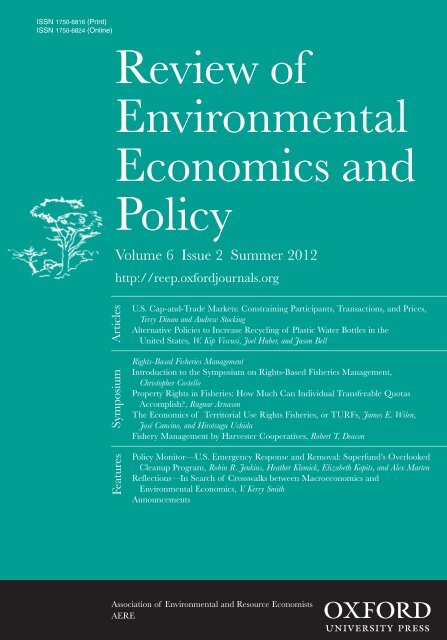自然资本经济学导论
IF 6.6
3区 经济学
Q1 ECONOMICS
引用次数: 12
摘要
自然可以被认为是一种资本(自然资本),它为人类的健康、繁荣和福祉做出了重要贡献。然而,导致气候变化、生物多样性丧失和其他生态系统退化的经济活动导致了自然资本的风险和代价高昂的损失。经济学在分析自然资本的价值和设计保护和恢复自然资本的激励措施方面发挥着核心作用。本次研讨会的特点是对自然资本经济学的关键研究前沿和进展的看法。研讨会的文章集中在三个关键问题上。Fisher, de Wit和Ricketts探讨了土地质量(尤其是森林覆盖和生物多样性)与人类健康之间的关系,强调了目前缺乏经济工具和方法来评估实现公共健康结果的替代干预措施。Barbier和Di Falco研究了土地作为一种生产性资产(其质量和持续退化)与发展中国家生活水平之间的关系。Brandon等人回顾了将自然资本纳入国民核算体系和国民经济政策制定的努力。这些文章共同强调了最近的进展,以及在扭转自然资本下降和实现可持续发展方面仍然存在的挑战。本文章由计算机程序翻译,如有差异,请以英文原文为准。
An Introduction to the Economics of Natural Capital
Nature can be thought of as a form of capital (natural capital) that provides essential contributions to human health, prosperity, and well-being. However, economic activity that leads to climate change, loss of biodiversity, and other ecosystem degradation has resulted in risky and costly losses of natural capital. Economics has a central role to play in analyzing the value of natural capital and in designing incentives to conserve and restore it. This symposium features perspectives on key research frontiers and advances in the economics of natural capital. The articles in the symposium focus on three crucial issues. Fisher, de Wit, and Ricketts explore the relationship between land quality—notably, its forest cover and biodiversity—and human health, highlighting the current lack of economic tools and approaches to evaluate alternative interventions to achieve public health outcomes. Barbier and Di Falco examine the relationship between land as a productive asset—its quality and ongoing degradation—and living standards in developing countries. Brandon et al. review efforts to bring natural capital into the system of national accounts and national economic policy making. Together, these articles highlight recent advances as well as the challenges that remain to reversing the decline of natural capital and achieving sustainable development.
求助全文
通过发布文献求助,成功后即可免费获取论文全文。
去求助
来源期刊
CiteScore
10.80
自引率
0.00%
发文量
25
期刊介绍:
The Review of Environmental Economics and Policy fills the gap between traditional academic journals and the general interest press by providing a widely accessible yet scholarly source for the latest thinking on environmental economics and related policy. The Review publishes symposia, articles, and regular features that contribute to one or more of the following goals: •to identify and synthesize lessons learned from recent and ongoing environmental economics research; •to provide economic analysis of environmental policy issues; •to promote the sharing of ideas and perspectives among the various sub-fields of environmental economics;

 求助内容:
求助内容: 应助结果提醒方式:
应助结果提醒方式:


